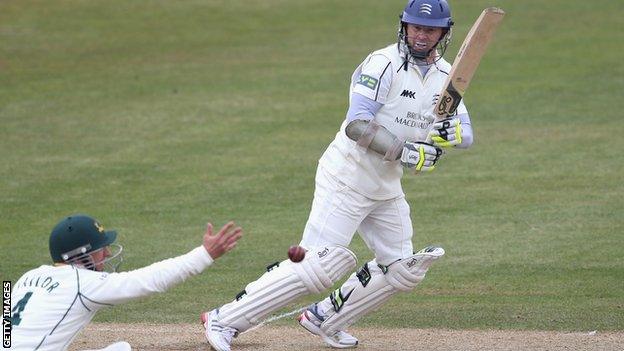Ashes 2013: Alec Stewart backs Australia over Chris Rogers pick
- Published
- comments

Australia's Ashes squad does not contain the star names of teams past, but it has a good blend of youth and experience, plus plenty of players who could cause England a problem or two.
Eyebrows may have been raised over the call-up of batsman Chris Rogers at the age of 35, but to my mind it is a clever and well thought through selection.
The retirements of Ricky Ponting and Mike Hussey have left Australia with a batting line-up desperately short of experience, so to pick a guy who has a proven track record in English conditions makes perfect sense.
Whereas the county spells of his team-mates Usman Khawaja, Ed Cowan, Phil Hughes and David Warner were all very brief, Rogers has shown over a long period of time that he understands how to score runs in England.
Over the last nine years in county cricket, he has scored 9,375 first-class runs at an average of 54.19 for Derbyshire, Leicestershire, Northamptonshire and Middlesex.
Whether he opens or bats at number three - and I would expect him to bat at three for Australia - he has shown a consistent ability to bat long and get big scores, having scored first-class hundreds in his career.
Although his only Test appearance came back in 2008 - when he made 15 and four against India at Perth - Rogers will be looked upon as one of the senior members of the squad and can also be an influence off the pitch.
He will have played regularly at all the grounds being used for the Ashes and will be able to pass on bits of local knowledge.
Australia's squad has also been strengthened by the return of Brad Haddin following a spell on the sidelines due to his baby daughter's serious illness.
Like Rogers, Haddin is 35 and brings with him a mental toughness built up over 96 one-day internationals and 44 Tests, including nine against England.
He is a typically gritty Australian cricketer, a good gloveman who has a touch of Ian Healy about him and knows how to score runs at number seven. He is also a proven leader, who will provide vital support to Michael Clarke in his role as vice-captain.
Back-up wicketkeeper Matthew Wade has shown flashes of talent and could even challenge for a top six batting slot, but Haddin, with his fighting qualities, was the natural choice for the short-term goal of wresting back the Ashes urn.
While one experienced Australian earns a recall, another is left out in the form of erratic paceman Mitchell Johnson.
Johnson burst onto the international scene with his form in South Africa in 2008 but has struggled against England. On his day, he is dangerous but he has not been consistent enough in his Ashes career to really demand selection.
His replacement James Faulkner is a left-armer who has an excellent domestic record for Tasmania in Australia and can score some handy runs lower down the order.
He forms part of an impressive-looking group of pace bowlers who will definitely trouble the England batsmen during the Ashes.
The one thing Australia do not have, of course, is a world-class spinner and I was not surprised to see Nathan Lyon named as the only slow bowler in the squad.
Beyond Lyon, who is a solid if unspectacular performer, Australia simply do not have any spinners of Test quality so they will be relying on their quicks to do the damage.
Australia are not the force of old but, with this squad, they have made a pragmatic selection to give themselves the best possible chance of winning back the Ashes.
I still expect England to be victorious but they will have to answer some serious questions along the way.
Glorious Gayle
Was Twenty20 cricket made for Chris Gayle? What he did for Bangalore yesterday, setting a new record for the fastest century in professional cricket by reaching 100 off 30 balls was unbelievable.
Whatever level you play at, whether it be school cricket, village cricket, international or IPL, to score that number of runs in that short space of times - 175 not out from 66 balls - is incredible and takes a very special talent.
It was entertainment of the highest order and I just hope we can continue to watch Gayle in all forms of the game for many years to come.
Alec Stewart was talking to BBC Sport's Sam Sheringham
- Published24 April 2013
- Published24 April 2013
- Published1 June 2012
- Published23 April 2013
- Published23 April 2013
- Published17 April 2013